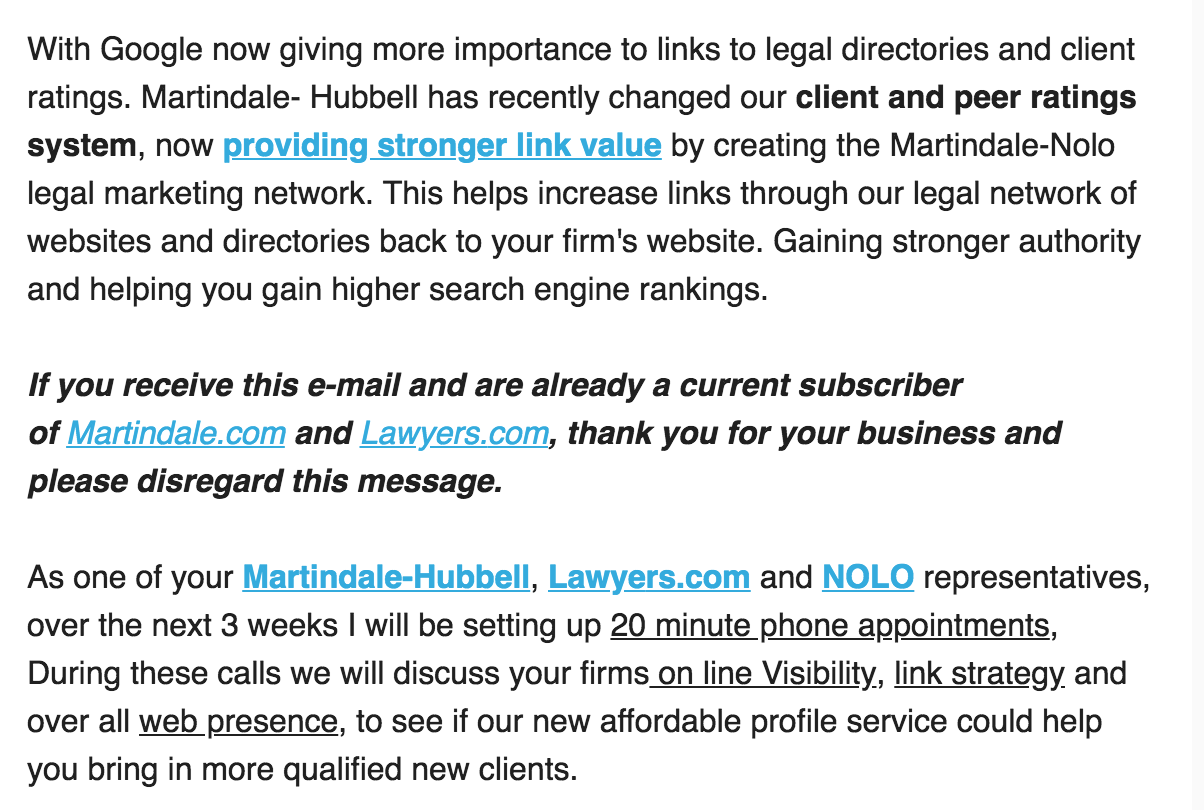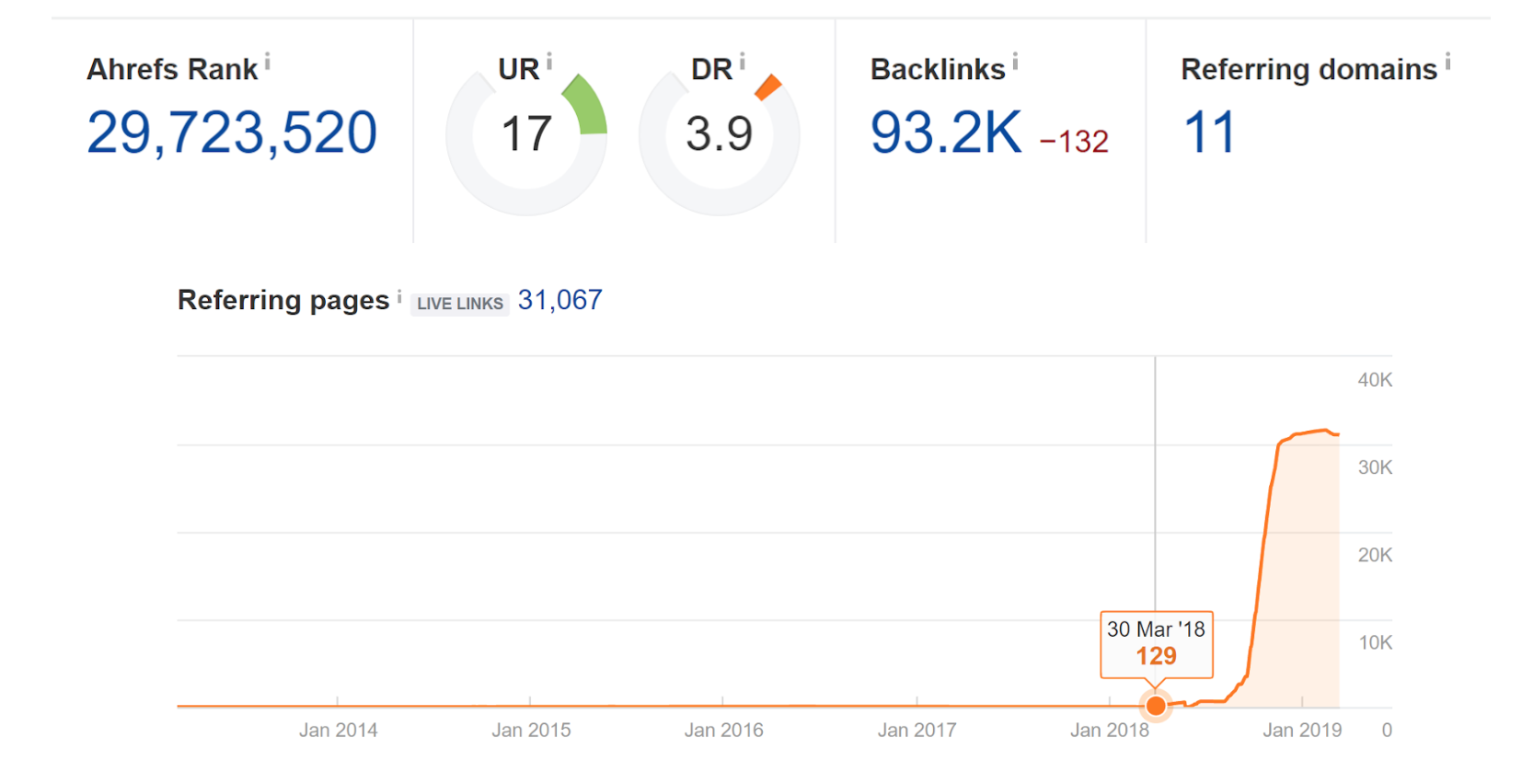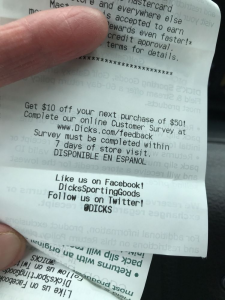Psssst…buddy…you…with the struggling website…yeah you. Want to buy a link? How about 5? I’ve got some nice, hot, untraceable links right here in my coat.
In the past 10 days, I’ve received questions from three different legal marketing agencies about Martindale’s new SEO product: The Martindale-Nolo legal marketing network which includes Nolo and Lawyers.com. It’s essentially a mass purchased linkbuilding scheme and people want to know: does this violate Google’s SEO guidelines against LinkSpam.
Short Answer: Yes it does.
But first, let’s hear from Martindale directly:

Hmmm…key messages are:
“providing stronger link value…helps increase links through our legal network of websites…help you gain higher search engine rankings”
Also…it’s “affordable” – meaning it’s paid. Isn’t this the flagrant buying and selling of links? Yes it is.
FindLaw Linkspam Provides Historical Context
Back in 2008 Findlaw got exposed for doing exactly this: mass emailing their clients with the offer of purchased links. This was called their: SEM-C product which enabled customers to purchase links and even specify the anchor text (remember anchor text?). You can find a copy of it here. This program got blown up quickly and received widespread backlash among the knowledgable (albeit small back then) legal online marketing community.
So, I didn’t think anyone would be so stupid as to replicate this experiment. Apparently I was wrong. Another variant of Martindale’s marketing materials states:
“This helps increase links through our legal network of websites and directories back to your firms website. Gaining stronger authority and helping you gain higher search engine rankings.”
Google Guidelines Violation
Does this really violate Google Guidelines? Yup. Yup and Yup. Read excerpts of those guidelines below and ask yourself if there’s any possible way Martindale isn’t setting themselves and their clients up for failure:
- This includes any behavior that manipulates links to your site or outgoing links from your site.
- Buying or selling links that pass PageRank.
- This includes exchanging money for links or using automated programs or services to create links to your site.
Note the key concern for law firms here is that these penalties impact not only the seller, but also the buyer of said links.
The Avvo Question
Now speaking of legal directory links, I’d be remiss in noting that AVVO recently sold to Internet Brands, who is also the owner of…Martindale. Back in July of this year, I reported that Avvo was removing contact information unless one purchased Avvo Premium. It was unclear if this included a link to the website. It’s also unclear if Martindale’s “network of legal websites” extends to Avvo as well, but it’s not too hard to connect these dots. I did reach out to the new Avvo people to discuss this further, but they demurred. On a personal level, I’d find it tragically ironic if Avvo is included within this scheme.
So…what’s going to happen?
If history repeats itself, all of these sites (both the sellers and buyers) may have a negative impact on their search traffic. According to the SEO rumor mill, the FindLaw link selling scandal generated a significant and protracted decline in traffic – although I frankly didn’t hear any rumblings of how this impacted the purchasers of said links. Granted that was way back in 2008, but I don’t suspect Google has gotten specifically dumber as it pertains to linkspam over the past decade. Further note that Google relies heavily on algorithmic learning and have been seeking out link networks for about 15 years now. Hiding this network from Google, especially with the large and prolific footprint of Martindale/Nolo/Lawyers.com (and hopefully not Avvo) would be extremely difficult. All Google needed was the linkbuilding smoking gun…an offer to sell links. And apparently, Martindale has just mass emailed that smoking gun to all of their customers (including agency owners who know better.)
 This is important because (at least in theory) these paginated navigational pages offer no unique content and really a very poor destination for users. Overall, they serve to dilute the quality of content and careful management of them can actually decrease page count while increasing traffic. The accompanying graphic shows how we reduced a law firm’s site page count by 149 tag pages which resulted in an immediate increase in traffic.
This is important because (at least in theory) these paginated navigational pages offer no unique content and really a very poor destination for users. Overall, they serve to dilute the quality of content and careful management of them can actually decrease page count while increasing traffic. The accompanying graphic shows how we reduced a law firm’s site page count by 149 tag pages which resulted in an immediate increase in traffic.





